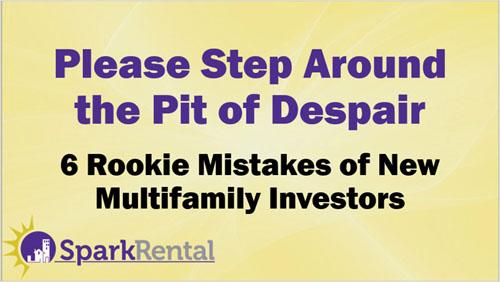
1. Plan Ahead for Splits
How? Treat each separate applicant as if they had to qualify for the entire rent amount themselves! That means everyone should be scrutinized the same: same credit standards, employment and income, landlord history; you get the idea. Why? If Roommate A has a great job and excellent credit, while Roommate B never saw a bill they felt like paying on time, expect some fireworks. In a best-case scenario, the responsible roommate cajoles, threatens, and browbeats their deadbeat roommate into paying on time… for a little while. You can be sure that someone’s leaving at the end of the lease term though (and it will probably the good one). Regardless, they won’t be sticking around long-term as your perfect, low-maintenance tenants. The explosions could come in the form of one roommate sending half of the rent on time, while the other sends an excuse. Do you charge a late fee? How much? Should you file for eviction? Can you evict only the one roommate? What if the responsible renter throws their hands up and moves out mid-lease term, leaving the bum? Then there are relationship or marital break-ups. They happen all the time, which mean they can happen with your renters! Do you want to be stuck in the middle with them (sang to the tune of “Stuck in The Middle with You” by the one-and-done Stealers Wheel)? Harry the Husband moves out, and Wendy the Wife wants to stay… but can she afford to, all by their lonesome carrying full housing costs on her own? Which all brings us to our second point.2. Screen Everyone Thoroughly!
 Did you run all your tenant screening reports, from full tenant credit reports to criminal background checks to nationwide eviction history reports?
Can each applicant can afford the rent on their own? Does each applicant have a stable job? How about credit – does each applicant have a history of paying bills on time?
If so, you’re in good shape even if one roommate breaks lease, or non-renews leaving the other(s) to stay.
However, if you decided that as long as each roommate could afford just their portion, and one leaves, expect a problem!
Furthermore, one tenant with bad credit may up and leave and not care about stranding the others to pay rent. After all his credit was not so hot anyway. People with good credit scores try to keep them that way.
People with shoddy credit don’t have anything to lose on that score.
Did you run all your tenant screening reports, from full tenant credit reports to criminal background checks to nationwide eviction history reports?
Can each applicant can afford the rent on their own? Does each applicant have a stable job? How about credit – does each applicant have a history of paying bills on time?
If so, you’re in good shape even if one roommate breaks lease, or non-renews leaving the other(s) to stay.
However, if you decided that as long as each roommate could afford just their portion, and one leaves, expect a problem!
Furthermore, one tenant with bad credit may up and leave and not care about stranding the others to pay rent. After all his credit was not so hot anyway. People with good credit scores try to keep them that way.
People with shoddy credit don’t have anything to lose on that score.
3. Use Powerful Lease Language
There is a little-known clause in lease agreements (well, good ones, anyway). The clause is known as (drum roll please…) “Joint and Several Liability”. Now, many people look past this clause. It is not only in lease agreements; you’ll see it in dozens of other contracts as well. And in this case, it’s there to protect you, the landlord.Free Mini-Course: Passive Income from Small Multifamily Properties
The Three Musketeers would chant, “All for One and One for All!” Basically, that is what this wonderful clause sets in stone (okay, paper). It makes sure that everyone is responsible for everything together and individually.
 Example 1: Tenant Bob decides that he wants to have a huge party while Tenant Mike is out of town. The party leaves a mound of issues (literally, including beer bottles) from noise problems to damage at your property. Tenant Mike tells good ol’ Bob to deal with it. Bob in various non-verbal gestures tells Mike off. Mike calls you. This is where you tell Mike, “I am truly sorry, but the railing must be fixed and both of you are legally responsible.” End of discussion!
Example 1: Tenant Bob decides that he wants to have a huge party while Tenant Mike is out of town. The party leaves a mound of issues (literally, including beer bottles) from noise problems to damage at your property. Tenant Mike tells good ol’ Bob to deal with it. Bob in various non-verbal gestures tells Mike off. Mike calls you. This is where you tell Mike, “I am truly sorry, but the railing must be fixed and both of you are legally responsible.” End of discussion!- Example 2: Tenant Mike pays his portion of the rent. Tenant Bob did not. (Yes, it is becoming apparent that Tenant Bob is a problem.) As the landlord, you send a late notice to, you guessed it, both Tenant Mike and Tenant Bob. Tenant Mike calls you, fuming. “I paid my rent,” he complains. And once again, your reply, “I am truly sorry, but whomever pays what, if the full amount is not paid, the rent is considered late.” The end!
Related Article Read : how to get down payment for investment property?
Related Article Read : how to buy rental property with no money?
4. Use a Roommate Lease Addendum
Spell out the details in plain English to each renter. Let each know that all are responsible for all that happens.
Reiterate that a lease clause is broken by one tenant, then legally all tenants have broken the rule.
Specify that the security deposit can and will only be released at the end of the lease term, once all occupants have vacated.
Some leases touch on these loosely, but make sure that your lease agreement is thorough, landlord-protective and state-compliant!
5. Never, Ever Get in the Middle!
Do not take sides. Repeat after me: “Not my monkey, not my zoo.”
Unless you have a propensity for drama, stay out of any issues, arguments or disputes of your cohabitating roomies. And frankly, if you do get involved in the commotion, it will not only cost you your sanity, but could end up costing you time and money as well.
6. Explicitly Require Approval for All Property Changes
Before allowing a change in locks, make sure you get a copy of all keys and get face-to-face (or better yet, written) agreement from all parties!
Here we go again with Bob and Mike. Tenant Mike has had it with Tenant Bob. He has not paid his portion of the rent, and the property is a mess. Mike comes to you and asks if you can change the locks.
Your answer: a simple “No – that’s a violation of our lease agreement.”
Mike comes to you again, explaining he found a great replacement for Bob. Your answer: “I will have to run a tenant screening on Bob’s replacement. I will also need you all to meet me in person, to sign a lease amendment.”
If you have an out-of-state rental, have someone you trust take care of it. Worst case scenario, have everyone sign in front of a notary.
Renting to adult roommates is not all rent disputes and rude hand gestures. Having multiple income-earning adults also gives you some peace of mind knowing that if one renter loses a job, there’s at least one other income-earner in the household that can likely carry the burden for a month or two.
Like so many other parts of landlording and property management, leasing to roommates is all about foresight and prevention. Screen all applicants thoroughly, use a landlord-protective lease agreement, stand your ground, and do not get involved in roommate squabbles!
What have your experiences been, with leasing to multiple adult lease signers? Any tips or tricks you’d like to share? We’re all ears!
Read llc mortgage loan requirements.
























